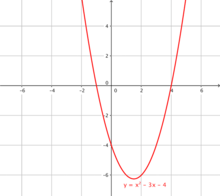Quadratic function
Appearance

In algebra, a Quadratic function is a function that contains an expression where its degree (the highest exponent it has) is 2, which means that it is quadratic (See etymology). Its single-variable standard form isː
Where , and are all constants and ≠ 0.
When such a function gets plotted on a graph where , a curve that extends infinitely called a parabola will appear.
When a quadratic function is set equal to zero, then it turns into a quadratic equation. The answers to the equation are where the function crosses the -axis.
Etymology
[change | change source]The word quadratic comes from the Latin word quadrātum ("square"). This is because of the presence of a number (which is in the standard form) that is the result of squaring its square root ().








